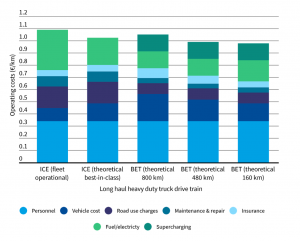A paper by the European Federation for Transport and Environment looks at the potential of battery electric heavy-duty trucking in the EU, in particular for the more difficult long-haul segment, by analyzing the technical feasibility, regulatory and market enablers and inhibitors, together with environmental impacts.
Heavy-duty trucks
The researchers provide an overview of the electric truck markets, which show more heavy-duty trucks with longer ranges being announced. In the European market, sales and series production have been announced by MAN, Volvo, Mercedes, and others. Tesla in the US will release its long-range Semi in 2019.
To test the technical feasibility of these trucks and to compare them with their diesel counterparts, the paper uses technical data and a simplified road load equation to compute the energy requirements for these vehicles, and the battery required to achieve the ranges claimed by manufacturers.
The paper analyses charging strategies and potential solutions to overcome the significant power requirements on the grid from fast charging.
In terms of total electricity generation, a European fleet of battery electric vehicles could require around 10% of present-day electricity generation.
The total cost of ownership
An analysis of the different methods of charging was carried out. Uncontrolled and opportunity charging would require large power demand, as would overnight charging, albeit at a lesser extent. Two solutions to reduce the peak power demands were discussed, including onsite stationary storage and demand-side management charging strategies. A total cost of ownership analysis was undertaken, taking into account wages, fuel use, insurance, road charging, and electricity costs. The main price sensitivity is the electricity price, which can be reduced with logistic planning to avoid uncontrolled charging as much as possible. The environmental benefits of battery electric trucks was highlighted.
The technical analysis enabled a total cost of ownership comparison between diesel and battery electric trucks, considering wages, maintenance, insurance, fuel and electricity prices, and road charging. The results show that the biggest sensitivity to cost competitiveness is the electricity price and to a lesser extent the road charging discount that may be applied to zero-emission trucks on motorways. This finding is contrary to some of the skepticism about both the technical and economic feasibility of battery electric heavy duty trucks.
Policies
The paper presents a number of enabling policies at the EU (and some at local) level were analysed, namely:
- CO 2 standards for trucks and trailers
- a zero emission vehicle (ZEV) mandate for trucks
- electricity pricing
- road charges, tolls, and fuel taxes
- zero-emission freight strategies for cities
- infrastructure
- the reform of the weights and dimensions directive, including payload allowance
- battery manufacturing.
- These policies will not only help the market case for BET but ensure truck makers are incentivized and required to increase their repertoire of BETs.
Source: Earl, T., Mathieu, L., Cornelis, S., Kenny, S., Ambel, C. C., & Nix, J. Analysis of long haul battery electric trucks in EU.

